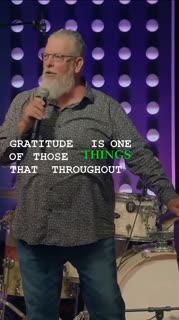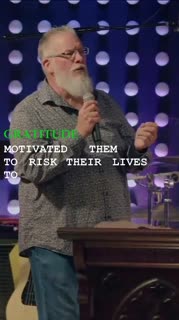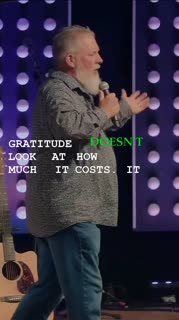Embracing Gratitude: A Lifelong Journey of Faith
Summary
In today's gathering, we explored the profound theme of gratitude, emphasizing its significance in our spiritual journey and daily lives. Gratitude is not merely a fleeting emotion but a foundational virtue that fuels our faith and actions. It is a continuous journey, one that we never truly graduate from, as it underpins every good virtue we aspire to embody. Through the lens of biblical narratives, we examined how gratitude can inspire acts of courage and kindness, even in the face of adversity.
We began by reflecting on the story of King Saul and the people of Jabesh Gilead. Despite Saul's flawed reign, the people of Jabesh Gilead remembered his act of kindness in rescuing them from their enemies. This memory of gratitude motivated them to risk their lives to honor Saul after his death, demonstrating that gratitude can transcend time and personal failings. This story challenges us to remember and honor the kindnesses shown to us, even when the benefactor is no longer present or has fallen from grace.
Transitioning to the New Testament, we considered the actions of Joseph of Arimathea and Nicodemus, who, moved by gratitude, courageously claimed the body of Jesus after His crucifixion. Their actions were not driven by obligation but by a deep sense of gratitude for the impact Jesus had on their lives. This narrative illustrates that true gratitude often requires us to step out of the shadows and publicly acknowledge the source of our blessings, even when it involves personal risk.
Gratitude is not about measuring the cost of our actions but about recognizing the immeasurable kindness we have received. It is a debt we willingly pay, not out of obligation, but out of a heartfelt desire to honor those who have touched our lives. As we reflect on these stories, we are encouraged to cultivate a spirit of gratitude, remembering the kindnesses we have received and allowing them to inspire acts of love and service in our own lives.
Key Takeaways:
1. Gratitude as a Lifelong Journey: Gratitude is not a destination but a continuous journey that fuels our spiritual growth. It is the foundation of virtues like generosity and joy, reminding us that we can never be grateful enough. Our journey in gratitude is eternal, constantly deepening our relationship with God and others. [31:58]
2. Remembering with Mercy: The story of Jabesh Gilead teaches us to remember others with mercy, focusing on their acts of kindness rather than their shortcomings. This perspective allows us to honor those who have impacted our lives, even if they were flawed, and encourages us to pass on stories of gratitude to future generations. [43:27]
3. Public Declaration of Faith: Joseph of Arimathea and Nicodemus exemplify the courage to publicly declare their faith, driven by gratitude for Jesus' impact on their lives. Their actions challenge us to move beyond being secret disciples and to boldly live out our faith, acknowledging the source of our blessings. [53:37]
4. Extravagance in Gratitude: True gratitude knows no bounds and is not concerned with the cost of our actions. Like Nicodemus, who brought extravagant gifts for Jesus' burial, our gratitude should be a reflection of the immeasurable kindness we have received, inspiring us to give generously and selflessly. [01:03:15]
5. Gratitude as the Fuel for Worship: Gratitude is the driving force behind our worship and service. It transforms our actions from mere duty to joyful expressions of love and devotion. By remembering the kindnesses shown to us, we cultivate a heart of gratitude that fuels our worship and deepens our connection with God. [01:13:37]
Youtube Chapters:
- [0:00] - Welcome
- [27:17] - Supporting Burundi Vineyard
- [31:58] - The Eternal Journey of Gratitude
- [36:04] - The Rise and Fall of King Saul
- [43:27] - Remembering with Mercy
- [48:27] - The Danger of Cancel Culture
- [49:16] - Gratitude Motivates Action
- [50:54] - The Power of Gratitude
- [53:37] - Joseph of Arimathea's Boldness
- [54:49] - Nicodemus Joins the Mission
- [55:48] - The Role of Wealth in Gratitude
- [01:03:15] - Extravagance in Gratitude
- [01:04:33] - The Virgin Tomb
- [01:07:07] - Gratitude Beyond Measure
- [01:11:39] - Practicing Gratitude
- [01:13:37] - Gratitude Fuels Worship
- [01:14:57] - Public Declaration of Faith
- [01:16:01] - A Hundred Pounds of Gratitude
- [01:18:03] - Going Public with Faith
- [01:19:08] - The Battle of Public Faith
- [01:25:11] - Becoming People of Gratitude
- [01:27:42] - Emotional Healing and Gratitude
- [01:29:16] - The Power of Kindness and Gratitude
Study Guide
Bible Study Discussion Guide: The Journey of Gratitude
Bible Reading:
1. 1 Samuel 11:1-11
2. 1 Samuel 31:4-13
3. John 19:38-42
---
Observation Questions:
1. In 1 Samuel 11, what was the initial reaction of the people of Jabesh Gilead when threatened by Nahash the Ammonite, and how did King Saul respond to their plight? [31:58]
2. How did the people of Jabesh Gilead honor King Saul after his death, despite his flawed reign? What does this reveal about their sense of gratitude? [43:27]
3. In John 19, what actions did Joseph of Arimathea and Nicodemus take after the crucifixion of Jesus, and what motivated them to do so? [53:37]
4. How does the sermon describe the relationship between gratitude and the virtues of generosity and joy? [31:58]
---
Interpretation Questions:
1. What does the story of Jabesh Gilead teach about the importance of remembering acts of kindness, even when the benefactor has significant flaws? How does this apply to our relationships today? [43:27]
2. How does the courage of Joseph of Arimathea and Nicodemus in publicly claiming Jesus' body challenge us to live out our faith more openly? What risks might this involve in our current context? [53:37]
3. The sermon suggests that gratitude is a continuous journey. How might this perspective change the way we approach our spiritual growth and daily interactions? [31:58]
4. How does the concept of "extravagance in gratitude," as demonstrated by Nicodemus' gift, challenge our understanding of giving and generosity? [01:03:15]
---
Application Questions:
1. Reflect on a time when someone showed you kindness. How can you honor their memory or actions, even if they are no longer present in your life? [43:27]
2. Are there areas in your life where you are a "secret disciple"? What steps can you take to be more open about your faith, similar to Joseph of Arimathea and Nicodemus? [53:37]
3. Consider the idea that gratitude fuels worship and service. How can you cultivate a heart of gratitude that transforms your actions from duty to joyful expressions of love? [01:13:37]
4. Think of a person who has impacted your life positively. Have you expressed your gratitude to them? If not, what is one specific way you can do so this week? [49:16]
5. How can you practice "remembering with mercy" in your relationships, focusing on the good rather than the shortcomings of others? [43:27]
6. Identify a situation where you might be holding back in your generosity due to fear of cost. How can you shift your perspective to see giving as a reflection of the kindness you have received? [01:03:15]
7. What is one practical step you can take this week to deepen your journey of gratitude, either through prayer, reflection, or action? [31:58]
Devotional
Day 1: Gratitude as a Lifelong Journey
Gratitude is not a destination but a continuous journey that fuels our spiritual growth. It is the foundation of virtues like generosity and joy, reminding us that we can never be grateful enough. Our journey in gratitude is eternal, constantly deepening our relationship with God and others. This lifelong journey of gratitude is not about reaching a final point but about continually growing and expanding our capacity to appreciate the blessings in our lives. As we cultivate gratitude, we find that it transforms our perspective, allowing us to see the world through a lens of abundance rather than scarcity. This shift in perspective fuels our faith and inspires us to live out our values with greater authenticity and purpose. [31:58]
"Let the word of Christ dwell in you richly, teaching and admonishing one another in all wisdom, singing psalms and hymns and spiritual songs, with thankfulness in your hearts to God." (Colossians 3:16, ESV)
Reflection: What is one small, daily practice you can incorporate into your routine to cultivate a deeper sense of gratitude in your life?
Day 2: Remembering with Mercy
The story of Jabesh Gilead teaches us to remember others with mercy, focusing on their acts of kindness rather than their shortcomings. This perspective allows us to honor those who have impacted our lives, even if they were flawed, and encourages us to pass on stories of gratitude to future generations. By choosing to remember with mercy, we acknowledge that everyone is a work in progress, and we extend grace to those who have shown us kindness, even if they have also made mistakes. This approach not only honors the memory of those who have touched our lives but also fosters a culture of gratitude and forgiveness that can be passed down to future generations. [43:27]
"Be kind to one another, tenderhearted, forgiving one another, as God in Christ forgave you." (Ephesians 4:32, ESV)
Reflection: Think of someone who has impacted your life positively but may have also let you down. How can you choose to remember them with mercy today?
Day 3: Public Declaration of Faith
Joseph of Arimathea and Nicodemus exemplify the courage to publicly declare their faith, driven by gratitude for Jesus' impact on their lives. Their actions challenge us to move beyond being secret disciples and to boldly live out our faith, acknowledging the source of our blessings. This public declaration of faith is not about seeking attention but about authentically living out our beliefs and values in a way that honors the impact that Jesus has had on our lives. It requires courage and conviction, as it often involves stepping out of our comfort zones and taking risks to stand up for what we believe in. [53:37]
"Therefore, everyone who acknowledges me before men, I also will acknowledge before my Father who is in heaven." (Matthew 10:32, ESV)
Reflection: What is one way you can publicly acknowledge your faith this week, even if it involves stepping out of your comfort zone?
Day 4: Extravagance in Gratitude
True gratitude knows no bounds and is not concerned with the cost of our actions. Like Nicodemus, who brought extravagant gifts for Jesus' burial, our gratitude should be a reflection of the immeasurable kindness we have received, inspiring us to give generously and selflessly. This extravagance in gratitude is not about the material value of our gifts but about the heart and intention behind them. It is about recognizing the abundance of blessings we have received and responding with a spirit of generosity that mirrors the kindness we have been shown. [01:03:15]
"Each one must give as he has decided in his heart, not reluctantly or under compulsion, for God loves a cheerful giver." (2 Corinthians 9:7, ESV)
Reflection: Consider a way you can express extravagant gratitude to someone who has blessed your life. What would that look like in action?
Day 5: Gratitude as the Fuel for Worship
Gratitude is the driving force behind our worship and service. It transforms our actions from mere duty to joyful expressions of love and devotion. By remembering the kindnesses shown to us, we cultivate a heart of gratitude that fuels our worship and deepens our connection with God. This gratitude-driven worship is not about going through the motions but about engaging with God in a way that is heartfelt and sincere. It is about allowing our gratitude to overflow into every aspect of our lives, transforming our worship into a vibrant and life-giving expression of our faith. [01:13:37]
"Through him then let us continually offer up a sacrifice of praise to God, that is, the fruit of lips that acknowledge his name." (Hebrews 13:15, ESV)
Reflection: How can you let gratitude transform your worship experience this week, turning it from a routine into a heartfelt expression of love and devotion?
Quotes
1) "Gratitude is one of those things that throughout eternity will never reach the point of being grateful enough. Gratitude is the fire, the fuel that fuels our fire. As I'm doing this study and I realize that it really lies underneath almost every good virtue that we need. You won't be generous with your money if you're not grateful with your heart. You won't serve with joy if you're not grateful to God for your service." [31:58] (30 seconds)
2) "Gratitude motivated them to risk their lives to honor the memory of this king. That's powerful. Not duty. There was no reward. Trophy for the head of Saul. Though King David in the next book, 2 Samuel, hears about it, calls them together, and blesses them for what they did. They get blessed, but that's not what motivated them. If you're motivated to be grateful because it's required of you, it's no longer gratitude. It's obligation. Gratitude is a debt that you pay because you choose to want to pay it." [49:16] (43 seconds)
3) "Gratitude doesn't look at how much it costs. It looks at how much you gave. Gratitude doesn't look at how difficult the task is. It's how kind you've been to me. And I want to say thank you for being kind. You don't owe me. I'm doing this because I'm grateful. You know, nobody paid Jabesh to go there. Now, David rewards them. They didn't know that. They just went and honored a man that saved their dad's life, saved their mom's life, saved their aunt and uncle's, grandpa's life." [01:07:07] (35 seconds)
4) "We're asking the Lord to make us people of gratitude. But you can't and you won't be grateful if you don't remember kindnesses. That have been done to you and for you or to others that have affected you to be grateful ultimately to Jesus where we give him our full hundred pounds of gratitude. I don't know. That just sticks in my spirit, that hundred pounds. I can just see it. It's like gratitude. If you had a, had a word picture, it'd be a hundred pounds of the most valuable substances you can think of a hundred pounds of rare jewels, gold, a hundred pounds, and it's nothing, nothing compared to you, Lord, nothing." [01:27:42] (69 seconds)




